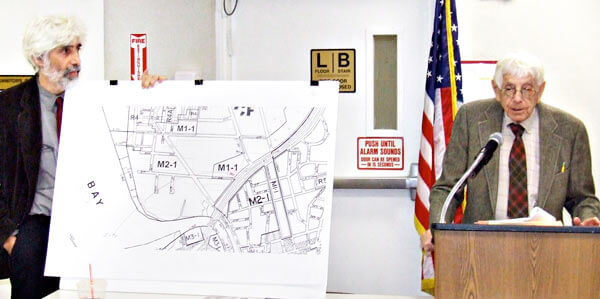By Rich Bockmann
College Point may not change its name to spa town just yet.
The neighborhood already has Spa Castle on 11th Avenue, and Community Board 7 considered an application for another during its meeting Monday night.
The board voted by a strong majority to deny a special permit representatives of S&I Property Management were seeking in order to build the New York Spa of College Point in the neighborhood’s corporate park.
The board’s College Point Corporate Park Task Force had previously recommended the permit for approval by a vote of 8-1.
Task force President Chuck Apelian cast the single nay vote back in September, and Monday he said he still had concerns about parking on the site, which would stack cars in rows three deep, and criticized the application for what he saw as a “lack of a cohesive plan going forward.”
The plan called for a pool to be installed on the building’s roof, and board Chairman Gene Kelty had questions about structural steel and pilings that would have to be installed to support its weight.
Architect Alan Sigman said pilings would have to be installed, but did not provide specifics on how many.
Kelty said it was important to know the building’s weight-bearing capacity, and pointed to the task force’s conclusion that other buildings in the area had not settled the way they were supposed to.
The board voted 25-5 to deny the application.
In other board news, the ground at the Bay Terrace shopping center appears to be a bit more solid for riders of the Metropolitan Transportation Authority’s Q28 bus.
State Assemblyman Ed Braunstein (D-Bayside) paid a visit to the community board and announced he had reached an agreement with the authority to ensure the Q28 bus stop will remain at the shopping center.
In June, the company that owns the center said the bus, which runs from Flushing and ends at Bay Terrace, was causing damage to the surface of 213th Place, the private road where the company had allowed the MTA bus to pick up and discharge passengers for several years.
Cord Meyer Vice President Peter Galletta said that after years of repairing the road surface, he requested that the MTA install a concrete bus pad, which he estimated would cost between $20,000 and $30,000.
The MTA responded that the city Department of Transportation was responsible for installing bus pads, and the DOT issued a statement saying the department did not install bus pads on private roads.
Galletta said he was considering removing the bus stop from 213th Place, which community members said would have a detrimental impact on the neighborhood.
Warren Schreiber, president of the Bay Terrace Community Alliance, said that if the bus did not turn around in the center, it would be forced to use residential streets in order to turn around and head back to Flushing.
It was for this reason Braunstein said he decided to seek state funding.
“It was important to me because moving the bus stop to a different location would cause the bus to go through a residential area and increase the distance that riders would have to travel, many of whom are senior citizens,” he said.
Braunstein said he is waiting for the MTA to sign an operating agreement with Cord Meyer for the plan to be finalized.
Reach reporter Rich Bockmann by e-mail at rbockmann@cnglocal.com or by phone at 718-260-4574.



































